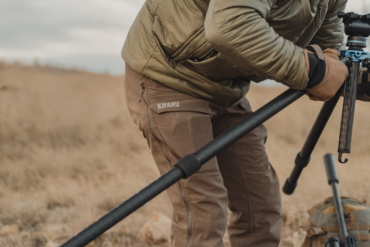Easily one of the most popular dog breeds on the planet, the field-bred golden retriever is also a phenomenal gun dog.
It’s unlikely that anyone reading this isn’t already well-acquainted with the golden retriever. Their countenance is often seen in dog parks, hanging out of car windows, accompanying kiddos on a neighborhood walk, working avalanche duty on the ski hill, or in the halls of hospitals in a therapy vest.
To say the golden retriever might be the happiest breed of dog could even be an understatement. Their sunny disposition and puppy-like attitude make them entirely irresistible. And they’re the third-most-popular dog in the U.S. because of their merry ways.
The good news is that a field-bred golden retriever is also one of the best, most versatile gun dogs you can take into the field.
Meet the Golden Retriever

Like many exceptional working dogs, golden retrievers originated in Scotland. And they have a more-than-interesting origin story.
A man by the name of Dudley Coutts Marjoribanks founded the breed singlehandedly in the late 1860s. He bought a brown, wavy-haired dog named Nous, and then bred him to Tweed Water Spaniels (now extinct) and Irish Water Spaniels, with the first true golden retriever litter born in 1868.
Today, the typical golden retriever averages 21-25 inches in height and typically weighs 55-75 pounds, with males on the higher end of both. They have a life expectancy of 10-12 years and throughout their life, their attitude for work and play remains exuberant. Of course, daily exercise and high-quality dog food will keep your golden in good health for the long haul.
Golden retrievers take on jobs that range from hunting to search and rescue to seeing-eye dogs to avalanche work and more. But with the popularity of the breed, a split happened between field- and show-bred retrievers. Read on for more.
Field-Bred vs. Show-Bred Golden Retrievers

As with labrador retrievers, the popularity of golden retrievers brought a dark side to its breeding history. For decades, many lines of golden retrievers were diluted, and new health problems arose through poor breeding practices.
According to the American Kennel Club, goldens are at risk for elbow and hip dysplasia, juvenile cataracts, pigmentary uveitis, progressive retinal atrophy, and heart diseases, including subvalvular aortic stenosis. And this is not an exhaustive list.
These days, veterinarians and responsible breeders have worked together to test and pair up genetically sound animals that are less prone to health issues through genetic testing and physical certifications. But, it’s important to delineate the intent of each line and to understand the differences in types of goldens. Especially if you’d like to hunt your golden.
Field-bred golden retrievers take on a more compact, athletic form, and a key feature is their shorter, denser coat. The show-bred lines tend to have luxurious and often very beautiful flat coats, but these longer coats do not serve a golden well in wet or cold working conditions.
The needs are simply different. Be sure to interview a few reputable breeders and learn about the lines, genetics, and intent of their kennels before purchasing a field-bred golden retriever.
Did their parents hunt? And what genetic testing and health certifications are offered? These are two required questions if you plan on adding a field-bred golden to your family.
Expect to pay a premium for a puppy with dedicated breeding, with pricing ranging from $800 at the low end to more than $2,000. Think of this as both an investment in a better future for the breed as well as a healthy future for you and your beloved family member.
Hunting the Golden Retriever

Hunting a golden is typical of hunting most of your bigger retrievers. They’re water-loving swimmers who shine in the duck blind, but they can also work an upland field with ease.
They retrieve naturally but will require shaping to perfect their bird retrieve to hand. They’re a versatile hunting companion who will just be stoked to come along with you wherever you end up.
Although goldens have a sunny temperament, they’re a bit more sensitive than your typical goofy labrador retriever. But, they’re generally easy to train due to their eager-to-please ways. And their high energy levels keep them engaged in any field of work.
The hunting-bred golden does tend to be more intense than other lines within the breed. But, this serves a purpose in the field.
Goldens remain fabulous house dogs, family dogs, and best friends once your day in the field is complete. They’re a dog you really can’t go wrong with; they’re well-loved for many reasons. And goldens love you back in spades. A true gem of a breed, this one.









